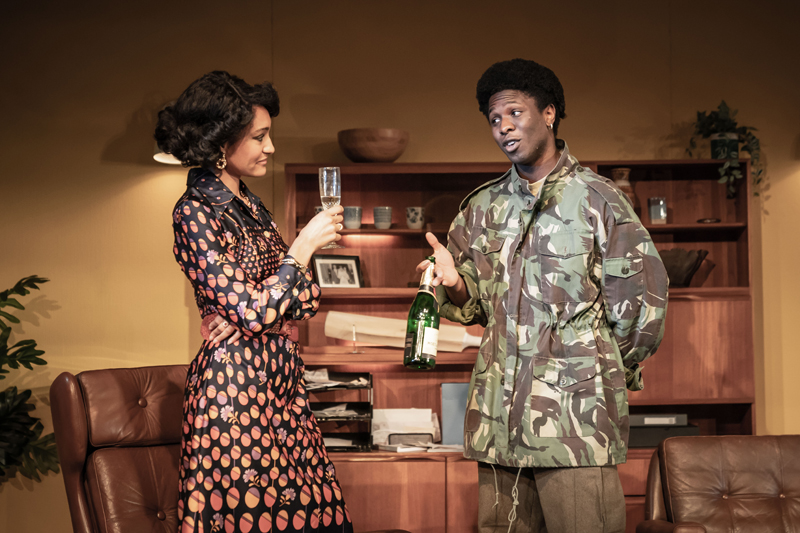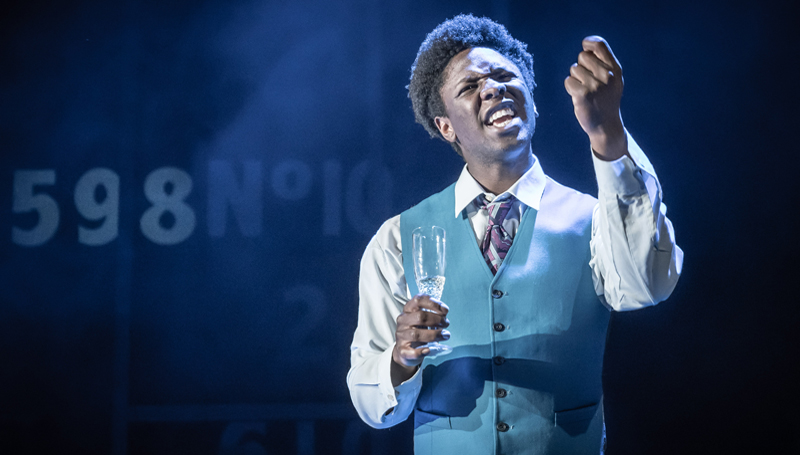“The Death of a Black Man”: Alfred Fagon
Jeremy Malies at the Hampstead Theatre
4 June 2021
Alfred Fagon’s rarely staged 1975 play The Death of a Black Man is finally given a revival at the Hampstead Theatre a year later than originally scheduled. Part of the “Hampstead Classics” season marking 60 years of producing new drama with four plays premiered at the venue, it was one of the many casualties of the Covid crisis but now gets another chance with the reopening of theatres.
The play begins with anti-hero Shakie (Nickcolia King-N’Da) swinging his cricket bat to hit imaginary sixes. (More about the bat later.) The play begins on the August Bank Holiday of 1973 when cricketing genius and black role model Sir Garfield Sobers smashed the England bowlers for 150 not out at Lord’s in north London.
Shakie is eighteen, and his business acumen has already seen him amass a fortune that has provided a Chelsea flat (closely observed wood and pastel-coloured period set by Simon Kenny for the first act) in which the fridge is always stocked with champagne. He is soon visited by Jackie (Natalie Simpson), an older Jamaican woman with whom he fathered a child when he was only 15.

Nickcolia King-N’da and Toyin Omari-Kinch. Photo credit: Marc Brenner.
The role of Jackie is initially underwritten and then tends to be stylized and possibly even surreal, but I was still disappointed that director Dawn Walton could extract so little from Simpson, an actor who I rate highly. Only 18 months ago she excelled as Masha in Three Sisters at the National Theatre during which she negotiated speeches with Vershinin that are regarded as some of the wittiest dialogue we have in the Western canon. Her lack of impact here surprised me until I realized that the production was going to be flat-footed in many respects.
There are wholesale borrowings from Harold Pinter’s The Homecoming – more like affectionate nods since the writers knew each other – as Shakie and his pal Stumpie, played by Toyin Omari-Kinch, resolve to pimp out Jackie (I can find no euphemism for this) to a wealthy Jewish punter on the King’s Road. You can add knee-jerk antisemitism to the catalogue of unpleasantness here, but the script offers no solutions. Sexism is rampant and Stumpie’s opening gambit with Jackie is to slap her in the face when he decides she is too middle class for a black woman.
Stumpie also plans to get rich quick by, wait for it, importing 20 pygmies (his word, not mine) to create a drumming troupe that will somehow prove the authenticity of African music. Meanwhile, Shakie is congratulating himself on having deceived his British furniture customers by selling them supposedly African creations that have in fact been made in a Yorkshire sweatshop by immigrants on starvation wages.
A theme that is dealt with skilfully throughout is the idea that the newly empowered often repeat the sins of their colonial masters by subjugating the weak in their own community. It explains some of Stumpie’s excesses and it’s not lost on me that, towards the end, the characters become archetypes. But whatever their vitality and superficial glitz, I don’t care about any of these people not even Jackie with whom there is a plot twist which might as well be kept under wraps even though it would be mad to bet on another revival of this play anytime soon.

Natalie Simpson and Nickcolia King-N’da. Photo credit: Marc Brenner.
There are some positives. Dialect coach Hazel Holder (no doubt as a decision by Walton) has the men alternate between three accents: Received Pronunciation, lilting Jamaican with the characteristic lack of verb–object agreement, and a modern Peckham-ish accent made famous by the TV sitcom Only Fools and Horses. They often swap idiom mid-sentence with precision while keeping a sense of spontaneity. It’s a subtle, dexterous way of showing confused identities and mixed loyalties.
You’d be forgiven for thinking in this era of super-charged identity politics that the title and the decision to resurrect this mediocre play reference George Floyd in some way. They don’t, and the death in question is that of Shakie’s unseen father who has proved himself to be one of the most innovative jazz musicians in Britain only to die penniless and unheeded in Manchester.
There’s a life-reflecting-art theme here in that when Fagon, a compulsive runner, died of a heart attack near his Camberwell flat in 1986 at the age of 49, all sorts of sweeping judgements were made by police and social services leading to him being unmourned and given a pauper’s funeral. Clues in his apartment should have revealed that he was solvent and a valued member of the theatre world. He is remembered now by the annual Alfred Fagon Award which marks an outstanding new piece of writing by a black British playwright with Caribbean or African heritage.
Oh, and the cricket bat. The type of bat that Shakie wields post-dates the era of the play by 30 years. We have been bombarded with cricket, ranging from video of the match in question projected on the foyer walls as we enter to a verbose 1,000-word essay in the programme. Even I tired of it, and I’ve written two books on the subject. Pinter, who ran his own cricket team and whose plays are suffused with cricketing references, would be incredulous. Fagon would simply be ashamed.









